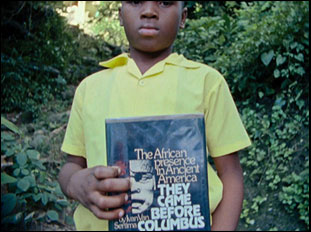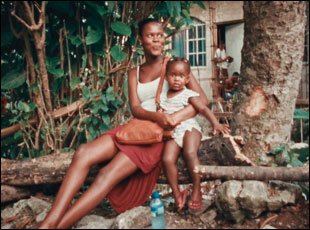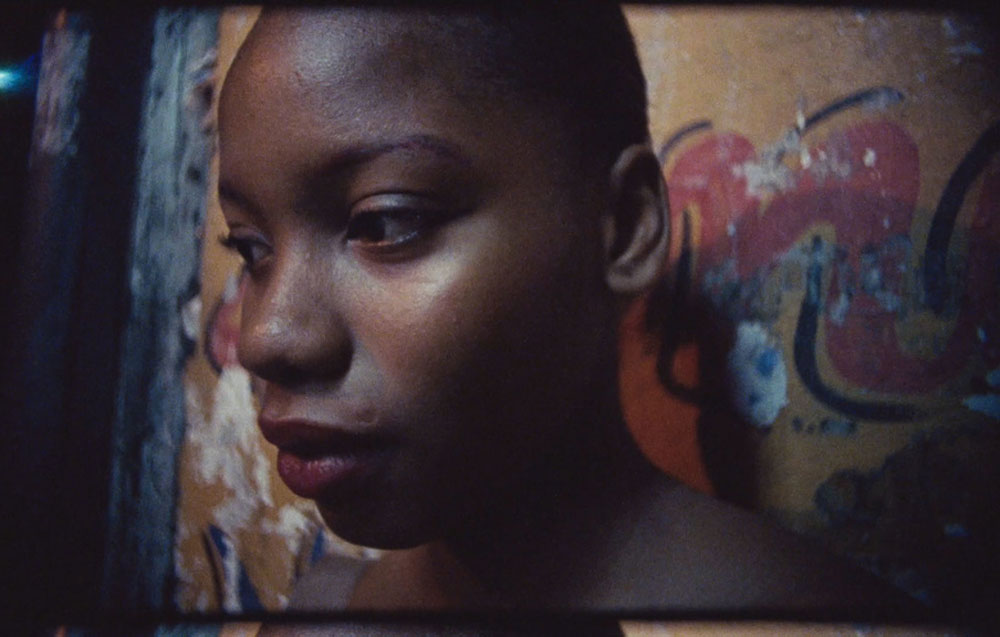Khalik Allah had been a week removed from the premiere of his second feature “Field N****s” at True/False when he decided to return to his ancestral home of Jamaica to make his next. It was a moment of triumph for the photographer/filmmaker who had posted the film to YouTube, only to have programmers at the doc fest in Columbia, Missouri discover it and lead others to see what they had, a singular look at a street corner in Harlem that detached the filmmaker’s interviews with those struggling to get by on the street with portraiture that burned their presence into your mind, with the slight disorientation apt to draw one closer to pay attention to those who have been historically neglected in a way larger society often doesn’t.
Making the connection between the present in which African-Americans have been disenfranchised to the days of slavery without moving more than a block was ambitious to be sure, but Allah had even bigger plans for “Black Mother,” perhaps starting filming in earnest in 2015, yet collecting footage of his family in Jamaica throughout the years to create an unforgettable portrait of the country and its citizenry where a generational continuum can be felt in the air at all times. Treating everyone he meets like family, the conversations Allah has are as striking as the way he captures them on film, chatting up street walkers and their johns with the same curiosity about their experience as he speaks to his late, deeply spiritual grandfather about his and for a culture defined by its contradictions, the filmmaker is constantly juxtaposing images to find a bonding spirit in the center, whether it’s scenes of young children full of promise mixed with moments spent with their weathered elders or the enrapturing feeling of sea and the yet-to-be-urbanized land versus the unforgiving city streets.
Employing a variety of formats from VHS to 16MM film to crisp digital footage, Allah creates a cinematic language all its own yet akin to the mix of spiritual and pragmatic explanations he receives to illustrate Jamaica’s evolution from an island under British colonial rule until the 1970s to what it is today, both visceral and tactile at times and transcendent in others. While it is nearly futile to describe what Allah has achieved, “Black Mother” is one of the great cinematic experiences of the year and just after the film played at AFI Fest in Los Angeles, he spoke to us about his unconventional editing approach, which begins with sound rather than picture, how he found a way in to tell the story of Jamaica through his family and why he isn’t wasting any time getting his next project up and ready.

Working with the audio was the most intricate part of my editing because I worked on that for two years before I really started layering the video into it. The audio gave the film the structure and the rhythm and a lot of the intimacy came across just through that and what people were willing to talk about and open up about. I don’t even consider [what I do to be] interviews. I look at it more as testimonies. I had six hours of deep discussions and to chisel that down into a 77-minute film was difficult, so I had all of the audio on a flash drive and I would drive around in my car, listening to it as I was driving, and I did this for months. Then I began cutting it up and putting things into themes — if I had so many people talking about raising children, I would edit that as if these people were in discussion with one another, even though the interviews were done separately. And then once I had all these different themes, I said, “Okay, I’m going to film a birth” [because] my relationship with Jamaica is through my mother. My maternal [side of the] family is Jamaican [and I also had this idea of] spiritual rebirth and giving people a new perspective on Jamaica. We only hear about the tropes – reggae, marijuana and rastafarianism – and I felt like I was birthing a whole new perspective on Jamaica by going beneath the surface with this film.
Instead of chapters, [I thought] let me put it into trimesters and the first trimester [will start with] these certain themes that I felt necessary to put at the beginning, and then it gets into these deeper themes of colonialism, colorism, skin bleaching. By the third trimester, it’s in that real spiritual dimension. You’re dealing with more prayers — you’re dealing with a funeral actually that’s in that third trimester and then there’s the birth, so it’s really four different chapters that helped me to thread the film and organize it structure-wise. But this is complete freestyle. None of this was scripted. It’s just what felt right to me, so I was making decisions based off what felt right.
When the audio and the images are disparate, are there juxtapositions you could get really excited about that you might’ve been surprised by?
The whole film is dealing with juxtaposition because you have the profane and the sacred married together in the film. They’re side by side. There’s that one scene in the film where the young man is getting a woman’s number from inside his car, and it’s like that’s how it goes down in the modern day, but then the next scene is my grandfather relating a story to me about how he met my grandmother and how she became his wife that’s a more old school approach, so I put those two scenes together to show how it is now compared to how it used to be. So none of it was really a surprise, but when you’re editing, you get as creative as you want, so I was trying to find creative ways to make it a surprise for the audience.

In 2011, I actually went and spent a couple weeks with my grandfather because I know that death is inevitable. He was 96 at that time, and he and I were best friends. We always had a really strong relationship, so I wanted to just go and hang out with him anyway, but because I’m a filmmaker and a photographer, I’m always going to be shooting stuff. He was blind in his left eye and deaf in one of his ears, so he wasn’t really focused on me filming. He was just speaking to me naturally like he always has done and including him in the film just added a level of intimacy and dignity and integrity into the film that I was looking for. He wasn’t a rich person, but he was royal and elegant and I just needed to keep him in there like that. Even though the film is called “Black Mother,” there’s a heavy focus on my grandfather and that’s due in part because my grandmother had passed away long before he did and they’re inseparable. That title [also] represents the water, the food, the land itself, the soil, the rain – all of that – and literally, the black mother. But it wasn’t supposed to be a definitive statement about the woman only. There’s so many other themes in the film as well.
When it’s a film that involves personal footage but takes on a national scope, did the balance of that change over time?
From the beginning, I knew I wanted my family to be included in it, but it wasn’t supposed to be biographical. Like I never say my grandfather was born this date in this parish to these parents, and in the editing process, I was just trying to preserve the elements of my family that were universal. That was like the benchmark of my decisionmaking and [likewise with Jamaica], if you notice in the film, I don’t really indicate where I’m at. I don’t say, “Okay, this is Kingston or this is Negril or this is Ocho Rios.” It’s just supposed to represent the whole island, the whole thing just mashed together. My earlier film was done on on street corner at nighttime and I knew this would be a lot different because instead of just being in one place, it was going to be the whole country.

I remember exactly and when you’re filmmaking, there are certain things that are just gifts. I always suggest having an open mind when you’re shooting. Keep an open mind, man. Because I was actually shooting something else at that moment. I didn’t have a big crew for this film, just my little brother and my boy Chris Watts, my brother’s friend, and [Chris] has one of those rolling gimbals that’s a camera stabilizer. He just handed it to me because I was like, “Yo, let me try that thing” because I had never really used it before. I was filming the water and then I panned up to a little boy who was using a plastic bottle to fish because [in Jamaica] they’ll just tie some line to a Coke bottle to fish and put a hook at the end, so I was filming that for a second, but I looked up and I saw the boat coming and I just said to [Chris], “Yo, let me get this shot.” He just walked out of the frame, and then it’s the sunset and the rasta coming in from fishing and it just went really well because I was filming in slow motion at that time. That [shot can be seen in the film] during one of my grandfather’s prayers in the film, and he’s talking about “have no fear, even if this beautiful land is destroyed,” because you know, a lot of these places in the Caribbean are getting hit with crazy hurricanes, but Jamaica has pretty much been safe and his prayer was along those lines. Again, this isn’t a cerebral project, this came from the chest, so [capturing that shot and putting it in context] was all feeling-based.
I felt it. What’s it been like taking it out into the world?
That’s really been a blessing to me. As a director, this is what you want. You want people to appreciate your work and to make room for the next project and I’m looking forward to making my next thing because I have all the support now. I came through with “Field Niggas” [which] also played at AFI, but in 2015, I wasn’t able to be there, so to come to AFI now with this film and see the support that I was given, [where] it’s just like “keep making work,” there’s no going back to the old job, that hustle life. [laughs] Now I feel there’s a lot of people excited about what I’m going to do next, so I just want to take my time and write a script and get back into my writing because these last projects were just documentaries in my own unique style and I feel like those are going to inform my feature films. [The way] photography informed my documentary approach, now I feel like the documentaries I’ve done are going to inform my fiction narratives, so I want to step out of my comfort zone. All of this is temporary, man. I’ve been to like 12 countries in 2018. It’s just been nonstop travel, so I’m happy to be home in New York, charging up and then I’m going to start working again.
“Black Mother” will open on March 8th in New York at the Metrograph. A full list of theaters and dates is here.




